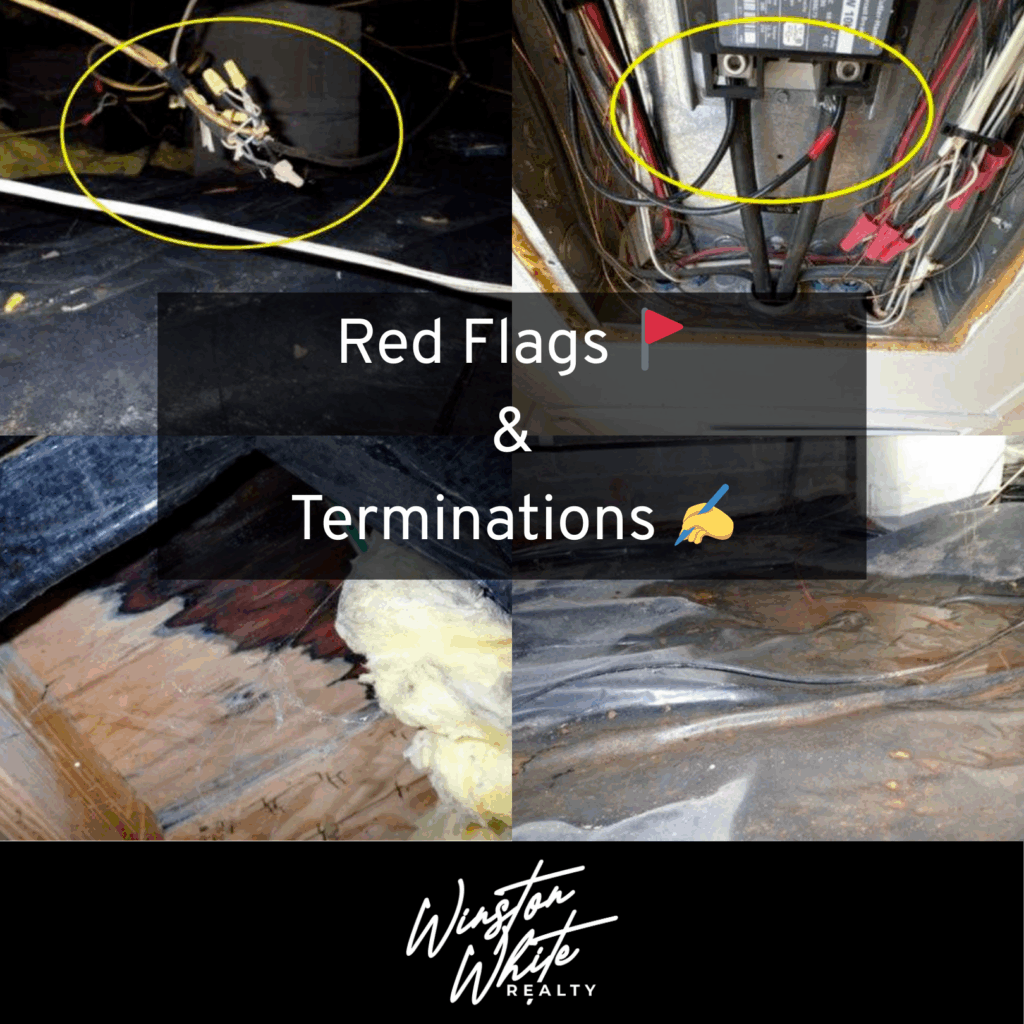Common Home Inspection Red Flags in Georgia That May Justify Terminating a Purchase Agreement | Winston White Realty

Common Home Inspection Issues in Georgia That May Justify Terminating Your Home Purchase Contract
Buying a home in Georgia is exciting, but a thorough home inspection is critical to avoid costly surprises. In areas like Monroe, it’s vital to work with reputable inspectors such as WIN Home Inspection or NPI Atlanta for a detailed evaluation. The due diligence period allows buyers to terminate a purchase agreement if serious issues arise. Below, we outline key red flags that may justify walking away, with insights for Monroe, GA, and tips to protect your investment. Always include an inspection contingency in your offer, and work with a trusted real estate agent to navigate findings.
1. Foundation and Structural Issues
Why It Matters: The foundation is the backbone of a home. Georgia’s red clay soil, which expands and contracts with moisture, can cause foundation settling, leading to cracks and structural instability. Major issues can cost tens of thousands to repair and compromise safety. Refer to the Georgia State Minimum Codes for structural integrity regulations.
Signs to Watch For:
- Large, horizontal, or jagged cracks in foundation walls or slabs (>1/4 inch).
- Stair-step cracks in brickwork or bowing basement walls.
- Uneven floors, sticking doors/windows, or cracks above openings.
Georgia Considerations: Heavy rains and poor drainage exacerbate foundation issues. In Georgia, ensure yards slope away from the house to prevent water pooling, which can lead to foundation heave or erosion.
What to Do: Consult a structural engineer for major issues. Minor hairline cracks may be normal, but significant damage or ongoing movement may warrant termination. Negotiate repairs or price reductions, or walk away if costs are prohibitive.
2. Termite and Pest Damage
Why It Matters: Georgia’s warm, humid climate is ideal for termites, causing $200–$300 million in annual damage. Hidden infestations can weaken structural elements, making active or extensive damage a deal-breaker. Find professionals via the Georgia Pest Control Association.
Signs to Watch For:
- Mud tubes along foundations or crawlspaces.
- Hollow-sounding wood, termite frass (sawdust-like piles), or discarded wings.
- Honeycombed wood or rotted siding, often with moisture damage.
Georgia Considerations: A termite inspection (“termite letter”) is standard, especially for VA loans. Sellers aren’t required to provide one, so buyers must request it.
What to Do: Request treatment and minor repairs for active infestations. Check for transferable termite bonds. Extensive structural damage may justify termination.
3. Major Electrical Problems
Why It Matters: Outdated wiring (e.g., aluminum or knob-and-tube) or problematic panels (e.g., Federal Pacific or Zinsco) pose fire and electrocution risks, potentially requiring costly rewiring.
Signs to Watch For:
- Double-tapped breakers or outdated fuse panels.
- Scorch marks, melted insulation, or flickering lights.
- Non-permitted or DIY wiring, ungrounded outlets.
Georgia Considerations: Older homes in Monroe may have undersized panels or risky wiring, affecting insurance coverage, and potentially causing fire hazard and safety concerns in the home.
What to Do: Get an electrician’s estimate for rewiring or panel replacement. Negotiate repairs or credits, or terminate if safety risks persist.
4. Water Intrusion and Drainage Issues
Why It Matters: Water damage leads to mold, rot, and foundation issues. Georgia’s heavy rains test roofs, gutters, and grading, making chronic problems expensive to fix.
Signs to Watch For:
- Water stains on ceilings/walls or musty odors.
- Efflorescence (white residue) on basement walls or standing water in crawlspaces.
- Poor grading, overflowing gutters, or downspouts dumping near the foundation.
Georgia Considerations: Clay soil retains water, increasing foundation pressure. Check FEMA flood maps for Monroe’s low-lying areas.
What to Do: Consult a waterproofing contractor for significant issues. Negotiate fixes like re-grading, water drainage solutions, or encapsulation. Severe issues may justify termination.
5. Plumbing Leaks and Aging Systems
Why It Matters: Leaks cause water damage and mold. Older homes with galvanized pipes, polybutylene, or outdated plumbing may require costly replumbing.
Signs to Watch For:
- Water stains under sinks or around toilets.
- Corroded pipes or low water pressure.
- Rust or puddles around water heaters.
Georgia Considerations: Humidity accelerates mold growth from leaks. Older Monroe homes may have aging plumbing systems.
What to Do: Minor leaks are negotiable fixes. Systemic issues require a plumber’s evaluation. Consider a sewer scope for older homes. Terminate if repairs are extensive.
6. Polybutylene Plumbing
Why It Matters: Polybutylene pipes (1978–1995) are prone to sudden failure, and pinhole leaks due to their interaction with treatment chemicals and substances in municipal water systems causing water damage. Insurers may not cover homes with these pipes, and replacement is substantial.
Signs to Watch For:
- Gray, flexible pipes stamped “PB 2110” in crawlspaces or at water heaters.
- Metal crimp-ring connections or signs of past leaks.
Georgia Considerations: Common in 1980s – 1990’s Monroe homes, polybutylene increases insurance costs and lowers resale value.
What to Do: Negotiate replacement or price reduction. Consider termination if unaddressed, and plan for re-piping if proceeding.
7. Mold and Air Quality Issues
Why It Matters: Mold from moisture can harm health, especially for those with respiratory issues. Georgia’s humidity promotes mold growth, requiring costly remediation if widespread. The Georgia Department of Public Health notes mold often stems from leaks or poor ventilation.
Signs to Watch For:
- Musty odors or visible mold under sinks, on walls, or in attics.
- High humidity (>60%) or poor ventilation in crawlspaces.
Georgia Considerations: Mold is common in humid climates, requiring professional remediation for significant growth.
What to Do: Request a mold test for significant growth. Negotiate remediation by certified professionals. Extensive mold may justify termination.
8. Crawl Space Problems
Why It Matters: Crawl spaces in Georgia homes are prone to moisture, mold, rot, and pests, affecting the entire structure. Major issues can be costly to fix and cause health concerns / poor air quality inside the home.
Signs to Watch For:
- Standing water, damp soil, or missing vapor barriers.
- Mold, rot, or termite damage on joists or beams.
- Rodent droppings or makeshift structural supports.
Georgia Considerations: Unsealed crawl spaces in Monroe attract moisture and pests, impacting indoor air quality as well as heating and cooling costs.
What to Do: Consult specialists for structural or pest issues. Negotiate fixes like encapsulation or dehumidifiers. Severe damage may warrant walking away.
9. Unpermitted or Amateur Repairs
Why It Matters: Unpermitted additions or DIY work may not meet code, posing safety risks and future liabilities. Check with the Monroe Code Department or Walton County Planning & Development for permit records and code requirements.
Signs to Watch For:
- Shoddy electrical/plumbing work or uneven construction.
- Missing permits for recent renovations.
- Improper structural changes (e.g., removed load-bearing walls).
Georgia Considerations: Monroe and Walton County require permits for major work. Unpermitted renovations may require retroactive fixes and cause safety concerns for potential homebuyers.
What to Do: Request permit documentation or professional certification. Negotiate price reductions or terminate the contract if risks are significant.
10. Hidden or Covered-Up Issues
Why It Matters: Sellers may conceal defects with cosmetic fixes, undermining trust and hiding costly problems like leaks or cracks. Home inspectors can oftentimes only inspect areas of a home that are readily accessible. If enough repairs are noted as improperly completed on the inspection report, its important to consider what additional items need repair that have been covered up.
Signs to Watch For:
- Fresh paint or new drywall in isolated areas.
- Rugs/furniture hiding stains or cracks.
- Blocked access to crawlspaces, basements, attics, or cavities in the home.
Georgia Considerations: Georgia requires disclosure of known defects, but some sellers may obscure issues, risking legal disputes.
What to Do: Request further inspections for suspicious areas. Demand disclosures or repairs. Terminate if trust is broken or issues are severe.
11. Poor Overall Maintenance
Why It Matters: Widespread neglect suggests hidden issues and future expenses, potentially overwhelming buyers.
Signs to Watch For:
- Peeling paint, rotting siding, or sagging gutters.
- Outdated systems past their lifespan (e.g., 20-year-old HVAC).
- Multiple minor defects indicating neglect.
Georgia Considerations: Humidity accelerates wear on neglected Monroe homes, increasing risks of rot and pests.
What to Do: Prioritize safety and major repairs. Negotiate credits or walk away if maintenance costs are excessive.
12. Lead-Based Paint (Pre-1978 Homes)
Why It Matters: Lead paint in pre-1978 homes poses health risks, especially for children and pregnant women. Properly abating or encapsulating lead paint adds additional costs and complications during home renovations. Sellers must disclose its presence by federal law.
Signs to Watch For:
- Peeling or chipping paint on trim or windows in older homes.
- Chewed windowsills or chalky residue on surfaces.
- “Alligatoring” of paint. Large patchy chunks of paint.
Georgia Considerations: Historic Monroe homes may have lead paint, requiring safe maintenance per Georgia DPH guidelines and federal EPA standards.
What to Do: Ask your agent to provide resources properly explaining the risks and considerations of lead-based paint. Test areas of concern and review any documentation provided by the seller concerning lead paint. Also consider future renovations and the cost associated with said renovations given the presence of lead paint.
13. Asbestos in Older Materials
Why It Matters: Asbestos in pre-1980s homes (e.g., popcorn ceilings, floor tiles) is hazardous if disturbed, requiring costly professional removal / abatement.
Signs to Watch For:
- Popcorn ceilings or 9×9 vinyl tiles in mid-century homes.
- Friable (crumbling) pipe insulation or vermiculite in attics.
Georgia Considerations: Renovations in older Monroe homes may trigger asbestos abatement regulations.
What to Do: Test suspect materials if renovations are planned. When in doubt, test. Negotiate removal or encapsulation, or walk away if costs are high.
14. Radon Exposure Risk
Why It Matters: Radon, a radioactive gas, can accumulate in basements and crawlspaces, posing lung cancer risks. Testing is recommended in Georgia, especially in North Georgia. Learn more from the UGA Radon Program.
Signs to Watch For: Radon is invisible; testing is the only detection method. Levels above 4.0 pCi/L require action.
Georgia Considerations: Walton County has moderate radon risk. The UGA Radon Program offers testing kits and advice.
What to Do: Request a radon test during inspection. Negotiate a mitigation system ($1,000–$1,500) if levels are high, or walk away if unaddressed.
15. Discontinued / Defective Building Materials
Why It Matters: Discontinued building materials can become problematic when a home needs a repair, but the material needed for repair is not readily available. This can cause delays in home repairs, or in worst scenarios a need to fully replace the roof / siding of a home due to a small area of concern. Defective building materials have similar concerns as a seemingly small issue can lead to surprising costs to homeowners as the life expectancy or availability of the material is affected.
Signs to Watch For: Discontinued siding, roofing materials, or other components of the home. Pressboard siding and certain brands of shingles have had recalls or product defects in recent years.
Georgia Considerations: Walton County, like every other area of Georgia has homes built with LP siding, or discontinued siding.
What to Do: Ensure you are working with a good agent and home inspector that can help you identify potential issues with the home and fully understand the costs / concerns prior to the expiration of your due diligence period.
Navigating Inspections with Confidence
No home is perfect, but serious red flags can justify terminating a purchase. Work with a knowledgeable agent to interpret reports, negotiate repairs, or decide to move on. At Winston White Realty, we guide Monroe buyers with transparency, leveraging local expertise and trusted contractors.
Local Resources:
- Monroe Code Department for permit records.
- Walton County Planning & Development for code requirements.
- UGA Radon Program for testing and mitigation advice.
- Georgia Department of Community Affairs for state minimum building codes.
- Georgia Pest Control Association for pest control professionals.
Disclaimer: This guide is for informational purposes. Always consult licensed professionals for specific property assessments.
Ready to Buy in Georgia?
Inspections can be daunting, but with the right team, you’ll make informed decisions. Contact Winston White Realty for expert guidance or browse our Georgia listings. Let’s find your safe, dream home!
FAQ: Georgia Home Inspections
- What are common inspection issues in Georgia?
Roofing wear, HVAC issues, plumbing leaks, electrical deficiencies, termite damage, and crawlspace moisture are frequent findings. A certified inspector, such as those listed by the Georgia Association of Home Inspectors, can help prioritize concerns. - Can I back out after an inspection?
Yes, during the due diligence period, you can terminate for any reason with written notice, recovering your earnest money. Consult your agent for timing. - Are inspections required?
No, but highly recommended. Georgia is a “buyer beware” state, so inspections protect your investment. - What if the seller won’t fix issues with the home?
Negotiate repairs, credits, or a lower price. If issues are severe, you can walk away during due diligence. If it doesn’t feel right, its not the right home for you. - Do I need specialized inspections?
Consider termite, radon, mold, sewer, or well/septic inspections based on the home’s age and condition. A qualified real estate agent can advise. - How much is an inspection?
General home inspections cost $350–$500 for an average Monroe home. Add-ons like radon, large homes, or termite tests range from $50–$200. - Should I attend the inspection?
Yes, to learn about the home and ask questions. Arrive for the summary if you can’t stay the entire time.
For personalized advice, contact Winston White Realty. We’re here to make your Georgia homebuying journey smooth and informed!
Contact Winston White Realty
Winston C. White






